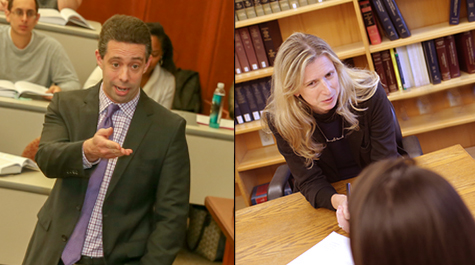Health, Crime and the Opioid Crisis: New Course Explores Public Health Epidemic
This semester, William & Mary Law students will have an opportunity to study the origins of the nation’s opioid crisis and the ongoing efforts to stop the epidemic. A new course — Health, Crime, and the Opioid Crisis — will take an interdisciplinary look at a public health crisis that stands squarely at the intersection of health law and criminal law.
The class was envisioned by Professor Stacy Kern-Scheerer, a health law expert who previously spent a decade drafting health policy legislation as an attorney in the United States Senate. Professor Kern-Scheerer will co-teach the course with Adam Gershowitz, a criminal law professor who is the Associate Dean of the Law School.
The course will cover a wide array of topics including how drugs are approved by the FDA and marketed by pharmaceutical companies to how doctors, drug dealers, and pharmaceutical companies can be criminally charged for improperly peddling prescriptions. Students will explore medical board regulation of physicians, state efforts to monitor opioid prescribing practices, laws governing drug trafficking, criminal statutes governing doctor shopping, prohibitions on obtaining fraudulent prescriptions, homicide charges, and much more.
The course will feature a wide variety of experts from outside the legal world. Professor Jonathan Scheerer of the William & Mary Chemistry Department will open the class by explaining the chemical makeup of different families of opioids and detailing the reasons that they are addictive.
Students will also examine the crisis from the perspective of physicians. The class will host Dr. Robert Couch, the director of the emergency department of a large hospital in Kentucky who is on the front lines of the opioid epidemic.
John Brownlee, the former United States Attorney for the Western District of Virginia will then speak to students about how his office brought the first criminal prosecution of a pharmaceutical company – Purdue Pharma – arising out of the opioid crisis.
After understanding the medical and legal landscape, the course will explore options for addressing the crisis. Students will consider FDA initiatives, proposed federal and state legislation, safe reporting laws that immunize drug users from prosecution, and civil lawsuits against the pharmaceutical industry.
Professors Kern-Scheerer and Gershowitz look forward to tying together their very different areas of expertise in health law and criminal law respectively. According to Professor Kern-Scheerer “to understand the complexities of the opioid epidemic we must examine the problem not just from a singular perspective, but consider the contributions – both to the epidemic’s causes and its potential solutions – of many diverse policy perspectives and disciplines.” Professor Gershowitz agreed, noting that “William & Mary seeks to teach students not just legal rules, but also how lawyers can take what they have learned in one area of law and use it to solve systemic public policy problems that cross numerous legal issues.”
About William & Mary Law School
Thomas Jefferson founded William & Mary Law School in 1779 to train leaders for the new nation. Now in its third century, America's oldest law school continues its historic mission of educating citizen lawyers who are prepared both to lead and to serve.



